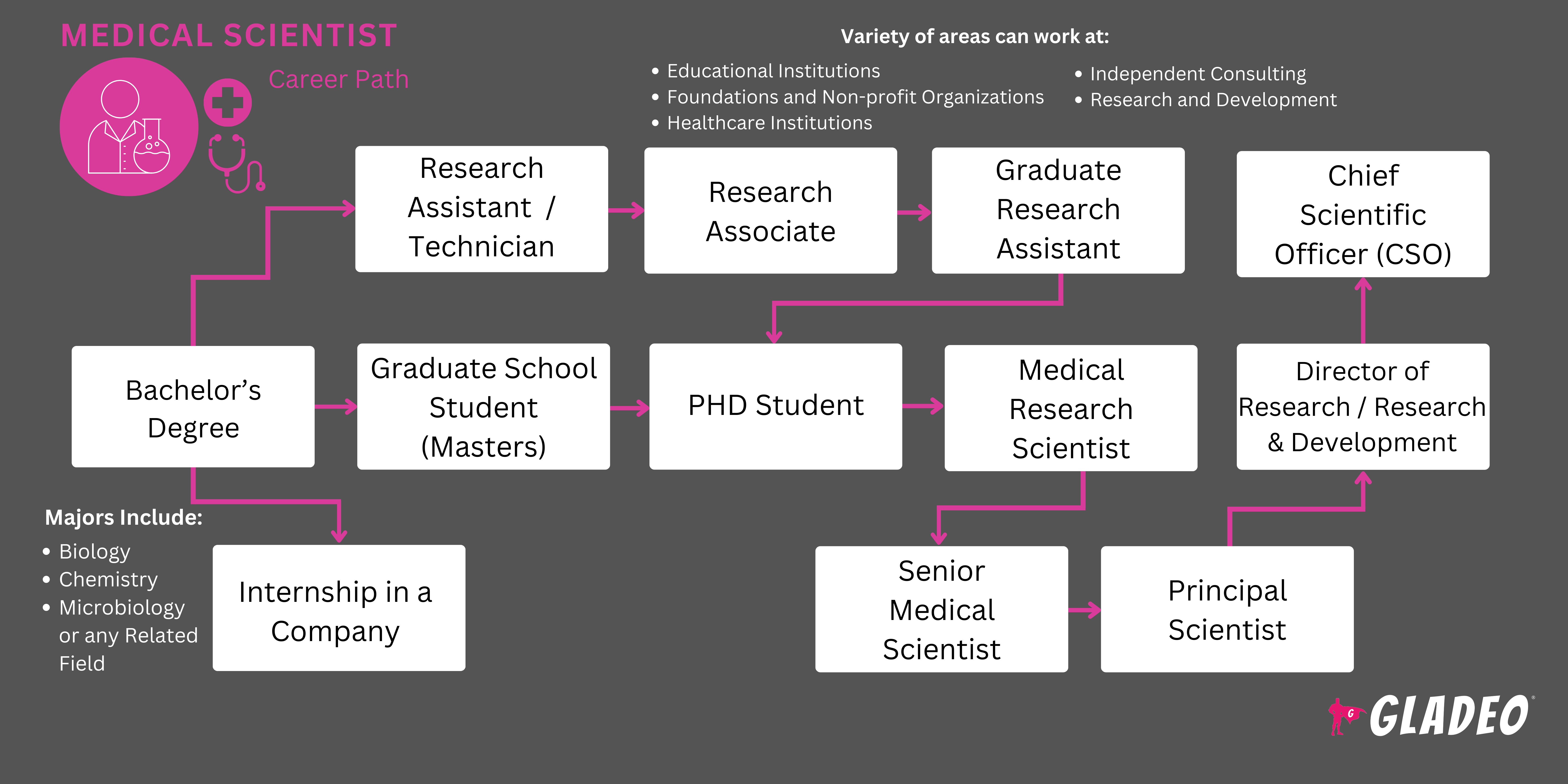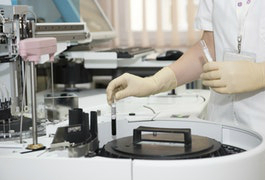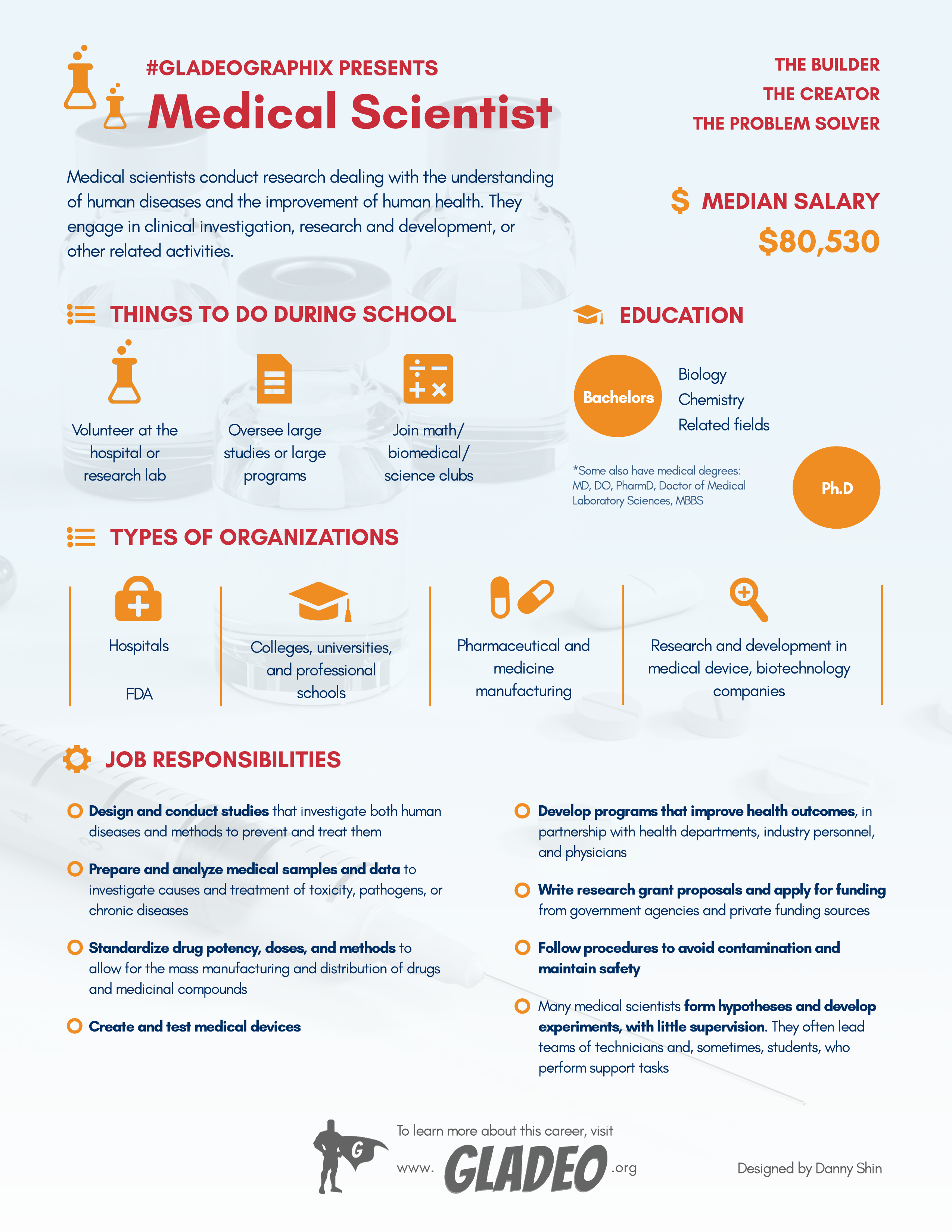聚光灯
临床实验室科学家(临床检验科学家)、临床药理学家、临床研究科学家、医学研究员、临床医生科学家、研究科学家、研究员、科学家、研究主任、毒理学家
医学科学家从事深度研究,并开展与药物及新型疗法相关的广泛测试与实验。他们通常在医院、大学或制药公司的实验室中工作,致力于探索创新方案以解决医疗难题,改善患者预后。从探究健康问题的成因到测试潜在疗法的临床试验,医学科学家是默默守护我们健康福祉的幕后英雄。
他们通常带领小型团队,指导技术人员或学生开展工作。当新药进入人体试验阶段,他们会组织研究并联系能招募合适志愿者的医生。试验结束后,他们分析结果、发表研究成果,并决定最佳的后续发展方向。 大学科研人员可能需要撰写资助申请书以获取关键研究的外界资金,而私营企业科研人员则受雇于公司,其研究领域也可能为企业创造价值。
- 探索或推进疾病治疗的研究
- 帮助患者活得更长久、更健康
- 为患者创造机会,使其能在新疗法公开前先行尝试
- 为学生可参与的关键性大学研究项目获取资金
- 帮助企业在投入资源进行实验性研发项目时保持盈利能力
医学科学家通常从事以下工作:
- 设计并开展研究,以探究人类疾病及其预防与治疗方法。
- 准备并分析医学样本和数据,以研究毒性、病原体或慢性疾病的成因及治疗方法。
- 标准化药物效力、剂量及给药方式,以实现药物和药用化合物的批量生产与分销。
- 开发和测试医疗器械。
- 与卫生部门、行业人员及医师合作,制定改善健康结果的项目。
- 撰写研究资助申请书,并向政府机构及私人资助方申请资金。
- 遵循程序以避免污染并确保安全。
- 许多医学科学家在几乎不受监督的情况下提出假说并设计实验。他们常带领技术人员团队,有时还带领学生团队,这些团队负责执行辅助性工作。例如,在大学实验室工作的医学科学家可能会让本科生助理为其研究进行测量和观察工作。
医学科学家致力于研究疾病及其他健康问题的成因。例如,从事癌症研究的医学科学家可能配制出能延缓癌症进展的药物组合。为验证这些药物,可开展临床试验。医学科学家可能与持证医师合作,在自愿参与研究的患者身上测试新配方的疗效。
在临床试验中,患者同意协助验证特定药物、药物组合或其他医疗干预措施的有效性。参与药物相关临床试验的患者在不知晓自身分组的情况下,会接受试验药物或安慰剂——即外观与试验药物相同但不含实际药物的药片或注射剂。
医学科学家分析所有受试者的临床试验数据,评估试验药物的效果。他们将结果与服用安慰剂的对照组数据进行对比,并分析参与者的特征属性。完成分析后,医学科学家可能撰写并发表研究成果。
医学科学家既致力于开发新疗法,也致力于预防健康问题。例如,他们可能研究吸烟与肺癌的关联,或饮食与糖尿病的关联。
在私营企业工作的医学科学家通常需研究对公司最有利的课题,而非追随个人兴趣。虽然他们不必为争取研究经费而撰写资助申请书,但可能需要向非科学背景的管理层或高管解释研究计划。
医学科学家通常专注于人类健康认知与改善这一广阔领域的特定研究方向。他们可能从事基础研究与转化研究,旨在深化健康认知或探索健康改善策略;亦可选择开展临床研究,针对特定实验性疗法进行探索。
- 医疗器械、生物技术公司的研发
- 学院、大学和专业学院
- 医院
- 制药与医药制造
- 医师诊所
- 美国食品药品监督管理局
软技能
- 能够独立工作或团队协作
- 沟通技巧
- 同情心与共情
- 富有创造力的、独创性的思维
- 批判性思维
- 出色的技术写作能力
- 客观数据分析
- 说服力
- 项目管理
- 机智与推理
- 协调与指导活动的能力
- 明智的判断与决策能力,有时需在压力下作出
- 时间管理
技术技能
- 数据库与查询软件
- 桌面出版
- 企业资源规划软件
- 良好的近视力
- 成像软件
- 集成开发环境软件
- 科学软件知识,例如IBM SPSS Statistics或Minitab
- 地图制作软件,例如ESRI ArcGIS
- 面向对象或组件的开发软件
- 感知速度
- 扎实的数学能力
- 技术阅读理解
- 技术写作能力
- 精通各类医疗设备,包括原子吸收光谱仪、台式离心机、β计数器、血气分析仪、热量计、化学分析仪、凝血分析仪、比色计等数十种仪器设备。
医学科学家致力于研发并提出挽救生命的药物及治疗方案,以供客户和患者选用。他们肩负着重大责任,必须开展极其严谨的研究,寻找解决方案,并确保所提议的产品或药物对人类安全无虞。任何失误或疏漏都可能导致患者病情恶化、出现意外副作用、药物不良反应,甚至危及生命。
而另一面则是面临的紧迫压力——必须快速解决导致疾病或伤亡的医疗难题。因此,医学科学家既需极端谨慎细致,又要在紧要关头保持紧迫感,当研究受阻时更可能承受压力与挫败感。 他们还面临接触传染性疾病或病菌的潜在风险,因此必须始终保持良好卫生习惯,并在必要时穿戴适当的个人防护装备。
这是一个日益发展的领域,部分原因在于人类寿命本身正在延长!医学科学家亟需为那些寿命延长却仍受慢性病困扰、需要药物治疗的患者寻找更有效的疗法。
社会仍深受癌症、艾滋病、阿尔茨海默病等广泛医疗难题困扰,必须通过持续努力加以应对。新冠疫情爆发后,各国在病毒不断变异成多种毒株的背景下,为遏制传播和研发疫苗而展开的科研工作呈现爆发式增长。与此同时,其他病毒持续变异并产生对现有疫苗的抗药性,迫使疫苗需要不断更新。
全球人口流动性日益增强,意味着当人们穿梭于各国之间时,若缺乏医疗界的预防方案,病毒与疾病便可能肆虐蔓延。与此同时,尖端纳米技术正彻底革新医疗产业,亟需医学科学家投身研究前沿。
医学科学家毕生致力于改善他人的健康状况。他们或许自幼便对数学、化学、生物学或科学领域充满兴趣,并思考如何将这些知识转化为切实造福人类的成果。作为幕后工作者,他们不追求聚光灯下的荣耀,更专注于实现科研突破。
他们的驱动力与决心可能源于童年经历——比如目睹至亲因缺乏有效疗法而罹患特定疾病离世。但他们从不被情感左右。医学科学工作者必须兼具同情心与客观性、乐观精神与谨慎态度,保持分析能力以避免判断受情绪干扰。他们是条理清晰的领导者,可能早在学生时代就曾主导过涉及复杂后勤与精密组织规划的团队活动。
- 医学科学家通常拥有生物学、生命科学或医学领域的博士学位。
- 本科阶段的学位最好也应属于相关领域。
- 部分学生选择攻读医学科学家培训项目的双学位课程,从而同时掌握实践技能与科研能力。
- 博士项目要求完成大量实验室工作、研究课题及学位论文,同时可能需要管理本科生助教团队。
- 大多数学生都专注于某个特定的研究领域,例如老年学或神经学。
- 医学博士生最初两年主要专注于实验室和课堂学习。
- 医学院可能要求完成3至7年的专科医师培训或住院医师培训,或进行涉及大量发表要求的博士后研究。
- 部分工作者在博士后或住院医师阶段就开始工作
- 任何从事药物管理或执业医师工作的人员均需持有认证或执照。
- 还提供其他核心和专业认证,例如:
- 医学实验室科学家 - 通过美国临床病理学会认证
- 医学物理学 - 经美国放射学委员会认证
- 医学毒理学 - 经美国急诊医学委员会认证
- 在查看项目之前,先确定你想主修和专攻的方向
- 根据O*Net的数据,29%的医学科学家拥有博士学位,45%完成了博士后培训。
- 请看该项目的设施与设备所展现的品质与现代感
- 查阅教师简介以了解其出版历史和专业领域;同时查看其获得资助的研究方向。
- 窥探校友网络,了解毕业生们离校后的成就
- 寻找提供宝贵学习和人脉机会的专业及学生组织
- 审核申请资格,确保您的申请具备足够竞争力,包括GPA、相关学术及工作背景,以及所需的标准化考试成绩。
- 时刻关注学费及杂费情况;寻找大学或项目关联的资助渠道,并及时掌握奖学金或助学金的申请截止日期。
- 未来的医学科学家应尽早投入课程学习,以打下坚实的基础。
- 相关课程包括解剖学、生物学、微生物学、生物化学、病理学和生理学。
- 其他重要课程包括心理学、医疗法与伦理学、技术写作、基金申请书撰写以及研究实验室。
- 切勿忽视你的沟通技巧!随着职业发展,你将与团队成员或学生、医疗专业人员、学术界或商界相关人士共事,并在临床试验期间可能接触患者。
- 越早决定专攻哪个领域越好
- 在探索从高中到成为职业医学科学家的不同路径时,保持条理清晰。
- 列出你的理想院校、目标院校和保底院校名单;确定进入每所院校的录取要求。
- 与学校顾问密切合作,如有需要,还可与家庭成员共同协作,助您顺利入读并保持学业进度。
- 随着您积累工作和学术经验,请详细记录并利用这些信息来构建未来的项目申请材料。
- 始终寻找奖学金或其他资助机会
- 若你的教授中有人是医学科学家,请尽可能多地向他们请教。积极协助科研工作,以此证明你在向他们学习的同时,也渴望为其研究增添价值。
- 尽可能多地阅读该领域的文献;及时了解当前趋势、技术及突破性进展。

- 根据美国劳工统计局数据,38%的医学科学家从事物理、工程及生命科学领域的研发工作。21%任职于高校,17%在医院工作,其余人员则就职于制药/医药制造企业或医生诊所。
- 前往就业机会多的地方。医学科学家遍布全国各地,但就业率最高的州是加利福尼亚州、马萨诸塞州、得克萨斯州、纽约州和宾夕法尼亚州。
- 请注意,就业岗位最集中的州是马萨诸塞州、马里兰州、华盛顿州、新泽西州和特拉华州。
- 薪资最高的职位集中在康涅狄格州、缅因州、特拉华州、新泽西州和田纳西州。
- 已完成所有必要的教育要求,以及(如适用)认证和执照要求。
- 部分医学研究人员在住院医师培训期间就已获得工作机会;而另一些人则需要凭借精心打磨的简历申请职位空缺。
- 确保您的简历完整列出所有教育背景和工作经历,并运用与招聘要求相关的关键词和短语。
- 务必详尽准确;您的简历应无差错,列出可量化的数据,并展示您的研究或工作所产生的影响。
- 聘请专业简历撰写人仔细审阅您的简历草稿,使其臻于完美。
- 在Indeed.com、Monster、Glassdoor等招聘网站设置职位提醒,同时告知人脉圈你正在求职。如今许多职位都是通过人脉网络获得的!
- 注意你的数字足迹;保持社交媒体的清洁,并及时更新领英个人资料。
- 询问之前的导师和教授是否愿意担任推荐人或撰写推荐信
- 通过模拟面试和研究潜在的医学科学家面试问题及答案来为面试做好准备
- 医学科学家的职位数量逐年增加,因此晋升空间十分广阔。
- 完成相关认证,这些认证能助你专精领域并提升个人资质。
- 持续发表研究成果,在专业领域树立个人声誉
- 不要仅仅跟随变化,而要通过运用新技术、新疗法和新药物来引领这些变化。
- 请时刻谨记,对待同事、学生和教职员工时,应保持礼貌与尊重。
- 成为一名尽职尽责的患者代言人;考虑投身于针对医疗资源匮乏群体及弱势群体所面临特殊医疗难题的研究领域。
- 寻找你的榜样!效仿他们,寻求指导,让他们的精神激励你的工作。
- 培养为你效力的教职工和学生,并成为他们的榜样
- 积极参与专业组织活动,包括出席会议、发表演讲、撰写或审阅学术论文。
成为医学科学家的道路可能漫长而曲折。最终,许多求职者都在寻求不同的职业方向。美国劳工统计局列出了许多可供考虑的替代性相关职业,例如:
- 农业与食品科学家
- 生物化学家与生物物理学家
- 临床检验技师与技术员
- 流行病学家
- 健康教育工作者与社区卫生工作者
- 微生物学家
- 医师与外科医师
- 高等教育教师
- 兽医
“如果你热爱科学,切勿因失败而却步——正是通过反复尝试与实验,我们才得以认知今日所知的大量事物。”罗尚·约加纳坦
新闻源

精选职位

在线课程与工具

年薪预期
新入职员工起薪约为12.7万美元。年薪中位数为14.8万美元。经验丰富的员工年薪可达16.5万美元左右。
年薪预期
新员工起薪约为10.9万美元。年薪中位数为13.1万美元。经验丰富的员工年薪可达13.7万美元左右。
年薪预期
新员工起薪约为12.2万美元。年薪中位数为13.8万美元。经验丰富的员工年薪可达14.2万美元左右。
年薪预期
新员工起薪约为12.4万美元。年薪中位数为12.7万美元。经验丰富的员工年薪可达15.3万美元左右。








